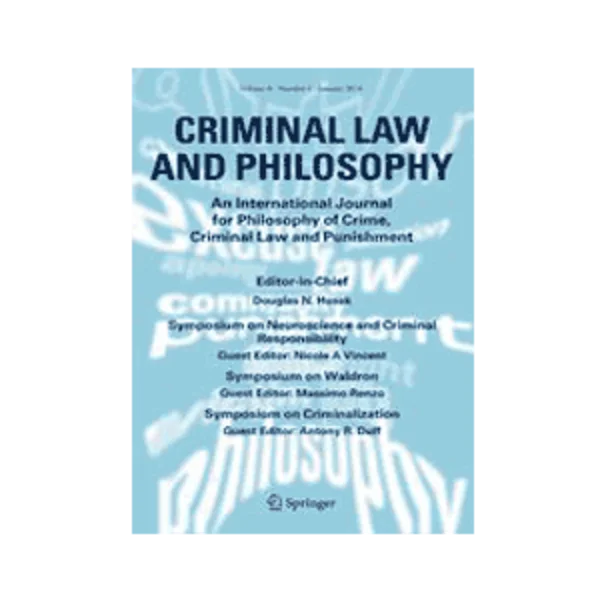-
should criminals be convicted of unspecific offences? on efficiency, condemnation, and cognitive psychology
جزئیات بیشتر مقاله- تاریخ ارائه: 1392/07/24
- تاریخ انتشار در تی پی بین: 1392/07/24
- تعداد بازدید: 973
- تعداد پرسش و پاسخ ها: 0
- شماره تماس دبیرخانه رویداد: -
assume that a person who is suspected of either murdering x or raping y credibly and voluntarily confesses to have committed ‘a terrible crime’ but immediately after this utterance decides to remain silent. the remaining available evidence cannot prove beyond reasonable doubt the exact offence which he committed. should such an accused be acquitted of both offences and evade the law or should a way be found to allow a conviction, although no specific offence can be proven beyond reasonable doubt? harel and porat suggest that such an accused should be convicted of an unspecific offence. this paper reaches entirely different conclusions, according to which the prevailing insistence of most criminal justice systems on offence specificity is justified. it is argued that offence specificity stems from the cognitive psychological difficulties associated with simulating the event in question if the accused is convicted of an unspecific offence. the reason is that fact-finders are unable to simulate the details of an unspecific offence while retaining a confidence level sufficiently high to satisfy the standard of ‘beyond reasonable doubt’. the fact-finder faces a choice between a proven offence which is difficult to simulate and a group of unproven offences which are easy to simulate. these difficulties also give rise to a more solid expressivist justification for offence specificity than that conceded by harel and porat. unspecific offences undermine the efficacy of condemnation because the message that corresponding convictions would broadcast to members of the public would be either blurred and ineffective or based on scenarios none of which was proven beyond reasonable doubt. this paper therefore offers two independent justifications for the prevailing insistence on offence specificity, both of which are based on the cognitive psychological difficulties of simulation, as found by the fact-finder and the public respectively.
مقالات جدیدترین رویدادها
-
استفاده از تحلیل اهمیت-عملکرد در ارائه الگوی مدیریت خلاقیت سازمانی و ارائه راهکار جهت بهبود
-
بررسی تاثیر ارزش وجوه نقد مازاد بر ساختار سرمایه شرکت های پذیرفته شده در بورس اوراق بهادار تهران
-
بررسی تأثیر سطح افشای ریسک بر قرارداد بدهی شرکت های پذیرفته شده در بورس اوراق بهادار تهران
-
بررسی تأثیر رتبه بندی اعتباری مبتنی بر مدل امتیاز بازار نوظهور بر نقد شوندگی سهام با تأکید بر خصوصی سازی شرکت ها
-
تأثیر آمیخته بازاریابی پوشاک ایرانی بر تصویر ذهنی مشتری پوشاک ایرانی (هاکوپیان)
-
بررسی اثر گسترش جانبی ناشی از روانگرایی بر لوله های مدفون طولی با استفاده از آزمایش های میزلرزه 1g
-
جایگاه دانشگاه فرهنگیان و تأمین منابع انسانی در سند تحول بنیادین آموزش و پرورش
-
پتانسیل خوردگی و رسوب گذاری آب آشامیدنی در سیستم های آب رسانی مراکز نظامی
-
بهینه مقاومت مشخصه جداگرهای لاستیکی – سربی در ساختمانهای بتنی تحت تحریکات نزدیک گسل
-
evaluation of temperature effect on growth rate of lactobacillus rhamnosus gg in milk using secondary models
مقالات جدیدترین ژورنال ها
-
مدیریت و بررسی افسردگی دانش آموزان دختر مقطع متوسطه دوم در دروان کرونا در شهرستان دزفول
-
مدیریت و بررسی خرد سیاسی در اندیشه ی فردوسی در ادب ایران
-
واکاوی و مدیریت توصیفی قلمدان(جاکلیدی)ضریح در موزه آستان قدس رضوی
-
بررسی تاثیر خلاقیت، دانش و انگیزه کارکنان بر پیشنهادات نوآورانه کارکنان ( مورد مطالعه: هتل های 3 و 4 ستاره استان کرمان)
-
بررسی تاثیر کیفیت سیستم های اطلاعاتی بر تصمیم گیری موفق در شرکتهای تولیدی استان اصفهان (مورد مطالعه: مدیران شرکتهای تولیدی استان اصفهان)
-
مروری بر بازاریابی دیجیتال و ابعاد آن از دیروز تا امروز
-
ارائه الگوی سرمایه اجتماعی کارآفرینانه با تاکید بر مسئولیت اجتماعی سازمان تامین اجتماعی استان گلستان
-
استفاده از شبکه های اجتماعی و ارتباط آن با سبک های هویتی و گرایش به رفتارهای پر خطر در دانش آموزان دبیرستان های شهرستان سراوان
-
شناسایی علت های تاثیرگذار خوردگی میلگرد فولادی در بتن آرمه و بررسی روش های مکانیکی مستقیم حفاظت از آن
-
بررسی تاثیر عوامل موثر بر تمایل کاربران به خرید اپلیکیشن های کاربردی




سوال خود را در مورد این مقاله مطرح نمایید :